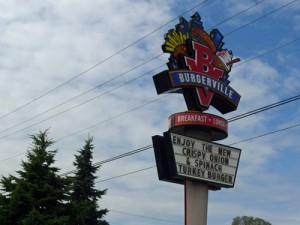
Parsons, Brad Thomas. Burgerville Sign. Digital image. Serious Eats. N.p., 26 Apr. 2010. Web. 19 Nov. 2015.
In July 2005, my family and I moved to rainy Oregon from hot and dry Texas. Instead of flying up, we decided to make a road trip out of it. One of my very first memories from Oregon is stopping to eat at a fast food place called Burgerville. I had assumed it was just like every other fast food chain, but they’ve really proven themselves different. Burgerville can probably be considered as one of the healthier and more sustainable fast food chains. They even guarantee that their food is of the highest quality and follows ethical standards (Partners « Burgerville).
The company hand picks their partners – most of which are local businesses that follow ethical practices. They also have included vegan and vegetarian choices, fish, and many seasonal items on their menus. In terms of protein, their burgers are made from pastured vegetarian-fed, antibiotic-free, and never frozen beef and the eggs on their breakfast menu are from cage-free and antibiotic-free hens (The Business Case « Burgerville). For sustainability, Burgerville is 100% wind powered and sends all of their used cooking oil to be recycled into biofuel. Their hour employees are also offered an accessible healthcare (Partners « Burgerville).
I rarely consume fast food, but I think Burgerville is definitely one of the better options out there. I admire their ethical practices, sustainability program, and, of course, that they’re mainly found in Oregon. Although they don’t have commercials and advertisements with creepy clowns, they provide a healthier alternative to fast food any day.
“The Business Case « Burgerville.” Burgerville The Business Case Comments. N.p., n.d. Web. 04 Oct. 2015.
“Partners « Burgerville.” Burgerville Partners Comments. N.p., n.d. Web. 04 Oct. 2015.